Doctor describes fighting to save her people in underground hospital 'targeted' by Assad regime
Dr. Amani Ballour became "the Cave's" lead doctor at only 28 years old.
In the western tip of Syria, airstrikes were a constant.
President Bashar al Assad has waged war against his own people since 2011, aided by Russia's military. The scale of terror and loss of life has been enormous; by some estimates, nearly 500,000 people have lost their lives and 6.6 million have been displaced.
Hospitals particularly became targets and, in 2013, a small group of doctors decided to go underground, 65 feet below the surface, to a subterranean, makeshift hospital they call "The Cave."
Dr. Amani Ballour became the Cave's lead doctor at only 28 years old. It would have been a nearly impossible feat for a woman in Syria, but not for a woman like her.
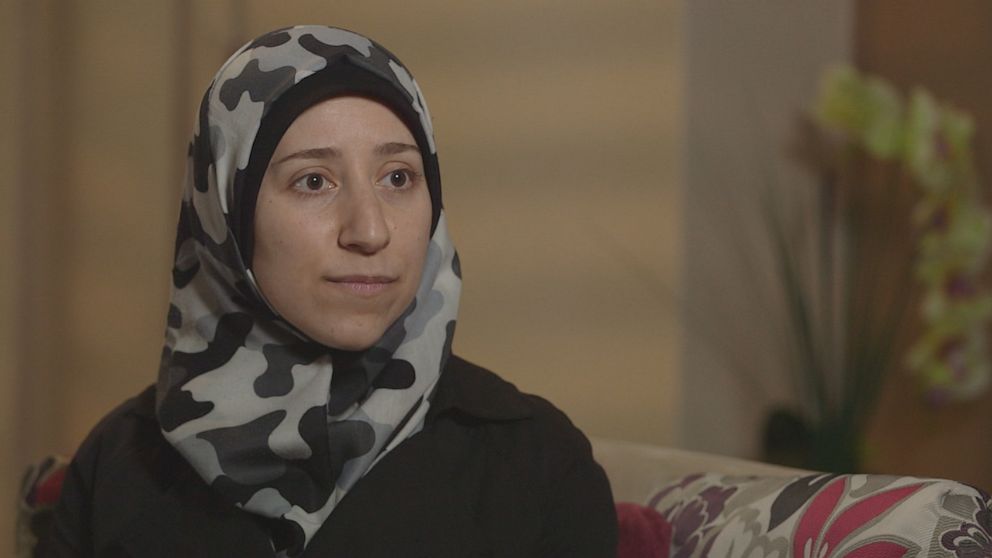
"My sister [got] married at 13," Ballour said. "And I didn't want that."
Ballour said her family had told her that she could be a teacher, but "not a surgeon," she said, but she refused to give up.
"I know I can do something different," she told ABC News Chief Global Affairs anchor Martha Raddatz. "I have these ideas very early, I know I can."
Against her family's wishes, Ballour began studying to be a pediatrician right as the war broke out. A year later, in 2013, her city Al Ghouta was under siege.
"They gradually closed everything, every entrance to Al Ghouta, and it was a very bad situation," she said. "One year ago before that, [they] prevented bread and [that’s our] main food. For us, it was very difficult."
Dr. Salim Namour, a fellow physician, had opened a small medical center underground and Ballour went to volunteer.
"I started in the Cave hospital when it was at the beginning. It was about two or three rooms. We have a surgery room. It was very small," she said.
Ballour said they couldn't expand the hospital to the surface because "they bombed everything."
"They bombed the hospitals a lot," she said.
Ballour estimated that in the six years she'd worked at the Cave, it had been bombed "20 or more times."
"They targeted it," she said.
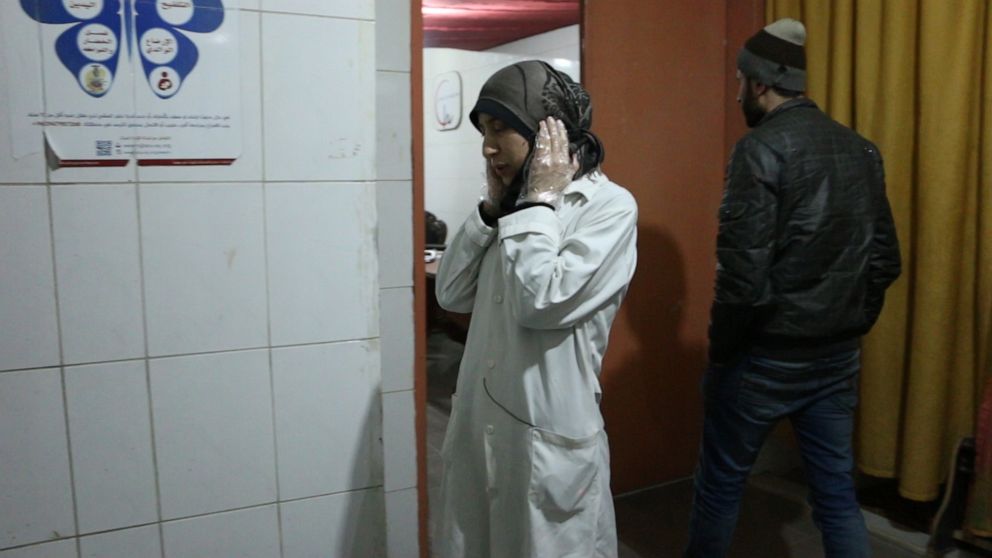
'Network' of underground hospitals started
Syrian-born filmmaker Feras Fayyad had heard about Ballour and the plight of hospitals in the region.
Fayyad said a "network" of underground hospitals started when the Syrian regime began. The regime intentionally targeted the hospitals, he said, because that's "where the victims come, where the people gather, where the people [will] be protected and where [there is] the hope of the life."
Fayyad said he'd witnessed the regime's brutality firsthand. While working on a film about an exiled Syrian poet, he said, he was jailed twice.
"I've been tortured," he said, adding that his torturers took his fingernails. "They use a brutal way of torture. I don't know how I survived."
He decided to do his next film on the network of underground hospitals, and then, thinking about his time in jail, he focused on the women working in the hospitals.
He said that while in prison, he'd heard women being raped and brutalized just because of their gender.
"Every time, I [would] imagine the sound that coming to my ears, it's my mother or my sisters," Fayyad said. "So when I get out, I want[ed] this story to come out."
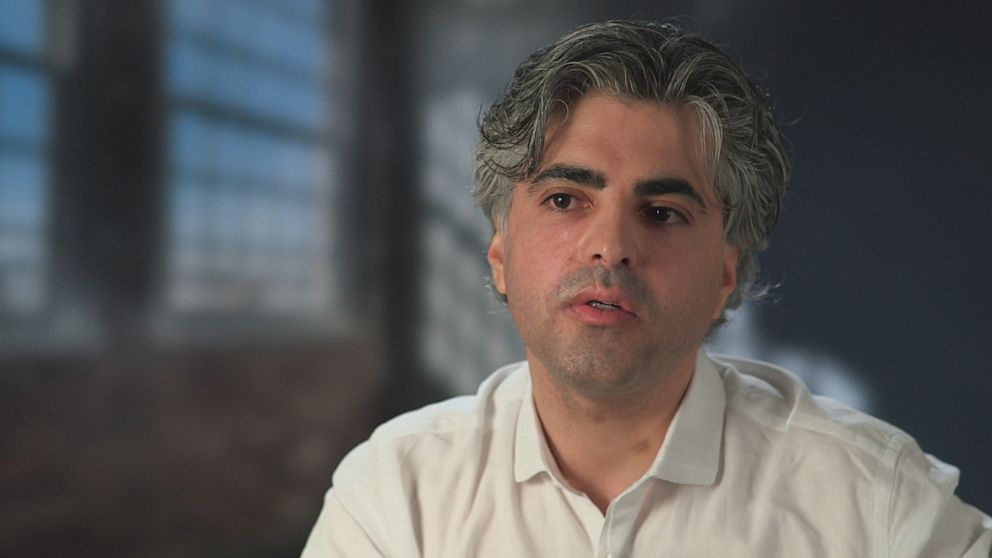
As he researched for the film, his work eventually incorporated Ballour into the story.
"I see something powerful in … the situation of [a] heroine," he said.
Fayyad and his team's footage became "The Cave," a film in conjunction with National Geographic Documentary Films, which flew "Nightline" out to meet Ballour for a sit-down interview. The Walt Disney Co. is the parent company of National Geographic and ABC News.
The film is a gripping, haunting look at one hospital, where staff are trying to save their fellow Syrians as the lives they once knew crumble around them.
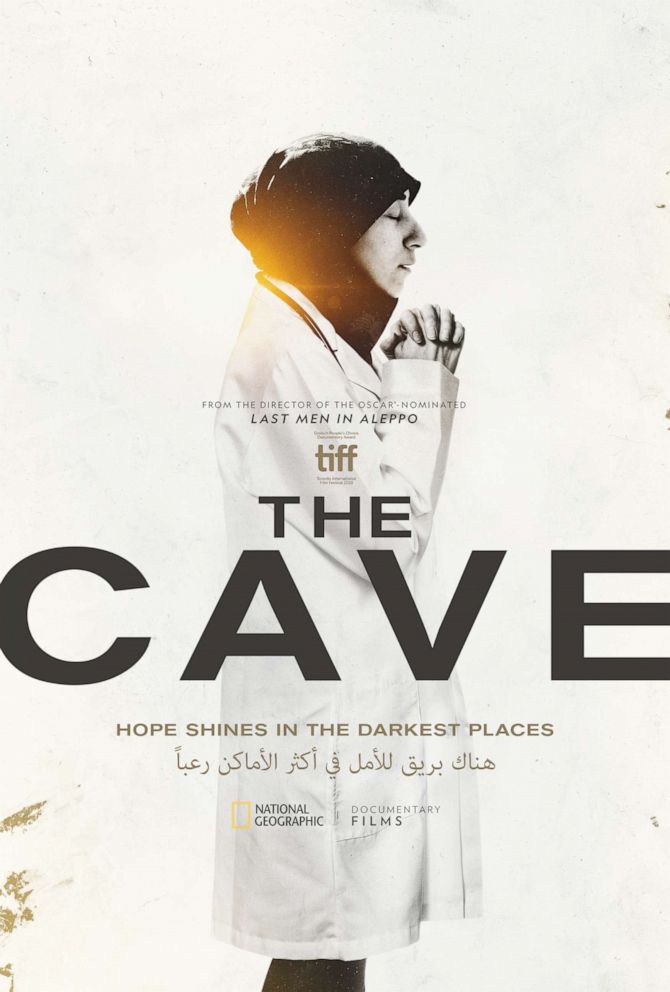
It details the doctors' time underground, their hardships and successes. It captures the moment Ballour's peers elected her to lead their group, but it also captures difficult moments, such as when a man refused to allow Ballour to treat his son because she is a woman.
Looking back on that moment, Ballour told "Nightline" those interactions had made her feel "frustrated because I can do something. I wanted to do something."
She said it was important to her that little girls in Syria see what a woman could do. Another important moment captured in the film is when Ballour reprimands boys who came into the hospital with their sister.
"Her brother would take over and talk, and she told him, 'Let your sister talk,'" Fayyad said. "The little girl was shocked. She never had the opportunities to talk. … The opportunities were taken from her, from her brother. This is how the men [in Syria are] raised. They are to have the first opportunities to talk. The woman, they have to silence."
"But what Dr. Amani [Ballour] did. … She give her the opportunity. The girl didn't stop talking. It changed her directly," he said. "It need just a little bit of sense of feeling to give this opportunity and then a lot of things will change."
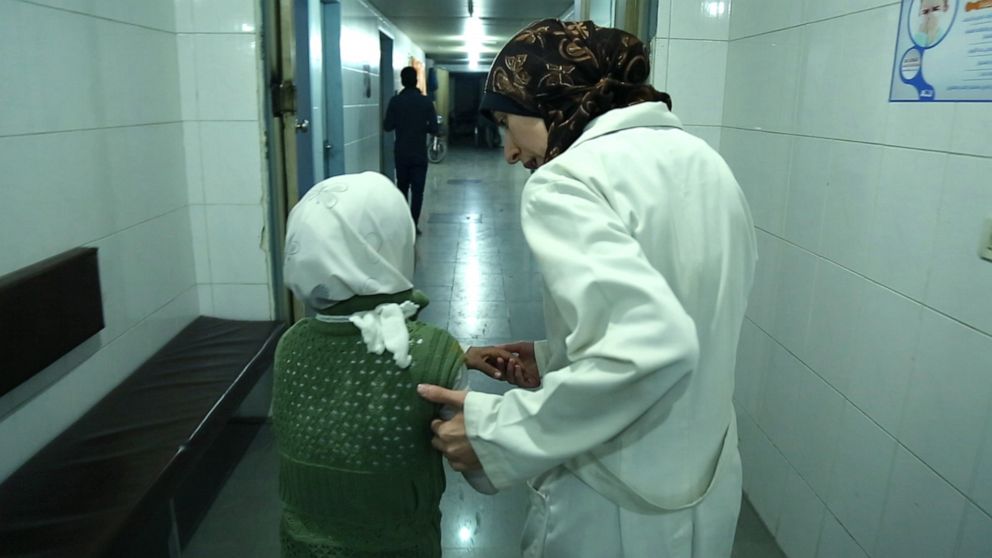
Ballour said that a lot of children she'd treated had told her they wanted to become doctors -- this is at the heart of what she and many other Syrians wanted in 2011 when the protests against the regime first started.
"When you are a human, just a human, not male or female, you are human. You have rights," she said. "You can do something. But when someone prevents you, you feel angry … and you have… something inside you to push you to change this."
Fighting to save lives, even as the regime seemed determined to take them, was the doctors' rebellion. Ballour said there were days that were incredibly difficult to get through.
"I saw thousands of children and some children, I saw them regularly in the clinic," she said. "They have, for example, chronic diseases. I used to see them a lot. And I called them my children because I love them. And unfortunately… some of them died in 2013 in the chemical attack and others."
Dr. Amana Ballour makes a difficult decision
In March 2018, Ballour and her staff were forced to deal with a chemical attack on their watch. At the time, doctors didn't know what was causing people to be so sick.
"I saw a man. … He has very small baby. He took his baby and … came to me. He said, 'Please help my baby.' He waited a long time to get this baby and his child was dead," Ballour said.
"It was very difficult. I can't explain everything, but this is the first time. We don't know what the problem is. We don't know what that substance is. We know it's chemical, it's chemical substances, and people were suffocating," she continued. "We try to treat the symptoms, but we don't know that it was sarin."
In 2018, after years of being in the Cave, Ballour made the gut-wrenching decision to leave.
"I didn't want to be out of this hospital. … I wanted to stay," she said.
She explained that the Assad regime started brutally attacking them. At one point, she said, they weren't able to go above ground for a month because of the bombings.
"And my brother said, 'We have to leave,'" she said. "When I get out of hospital … you take my soul, so it's very hard. It's very hard."
Ballour managed to escape Syria. She was granted refugee status in Gaziantep, Turkey, where she currently lives. She also got married.
She said some of the other members of the Cave's staff who stayed behind had been arrested. One doctor was killed in prison after his arrest, she said.
They are all still on her mind.
"I have a lot of memories -- most of them are bad memories. I dream a lot of these things sometimes. I woke up at midnight, crying, because I hear bombing or something like that," she said. "It's [a] very bad situation now in Syria."
Many experts view the Syrian conflict as a proxy war of sorts with several nations' interests at play.
President Donald Trump announced in October that U.S. troops were pulling out of Syria, leaving the Kurdish fighters who had partnered with Americans on their own. Trump later sent several hundred troops back to protect oil reserves.
"Well, there's a lot of nervousness at the moment," Mark Cutts, the United Nations' deputy regional humanitarian coordinator for the Syria crisis, told "Nightline." "Everybody is so concerned about their future. There's so much uncertainty and anxiety and fear. And unfortunately, so many people are just living in fear, driven by fear."
"Thousands of people have fled across the border into Iraq in the last two weeks," he continued. "People have been displaced internally. And we need to see all of these assurances are really being put into practice."
Trump met with Turkish President Recep Tayyip Erdogan earlier this month, telling reporters they are "very good friends," but failed to resolve the issue of Turkey being accused of violating a ceasefire agreement and targeting Kurdish fighters.
"We know that in times of war there are always atrocities," Cutts said. "We had a humanitarian convoy that was trying to reach a facility … that was not able to get through because of continued clashes. So we know that the fighting is [continuing] and it's often civilians are also caught up and civilians also get killed."
Human rights groups told ABC News that the Turkish government has been quietly planning to send refugees back to Syria in designated safe zones. Refugees in Turkey are already restricted to certain areas of the country and are required to carry special identification.
Turkey currently hosts the largest number of Syrian refugees at 3.6 million. Organizations, like the Maram Foundation, have moved into the country to provide desperately needed resources and education.
'I hope I can get a girl and support her to be strong'
Yakzan Shishakly, who used to own a business in Houston, Texas, returned to his native Syria to start the foundation. In Hatay, a border town, ABC News visited a school that the foundation had started.
"What we're trying in our program to do [is] like holistic approach, meaning we give food and that we give fun with the psycho support and would do gaming while we're teaching," Shishakly said. "The children are happy. They're learning math and happy, and that doesn't happen everywhere."
Ballour, the former leader of the Cave, saw little happiness during her time treating children in Syria.
Since leaving Syria, she's been unable to practice medicine until she masters the Turkish language and passes the country's medical exams. She said she does eventually want to go back into medicine but plans to practice radiology instead of pediatrics. The memories of what she endured still haunt her.
"Every child I saw, I remember someone in Al Ghouta and I remembered how they were suffering. I couldn't work with them," she said. "I was very, very, very sad, very frustrated and very angry. ... No one know about that and no one help these children. And I couldn't start again. It's difficult to see children again."
Despite all she's seen and been through, Ballour said she still wants to have children.
"When I was in Al Ghouta, I said, 'No, I will not have children.' … But what [about] now? Yeah, I want a child, and this is a dream to me," she said. "I hope I can get a girl and support her to be strong."
Her dream is for Syria to become a place where that little girl, and all the children there, cannot just exist but live in a free country that's all their own.
"We don't want war, and we don't want any country to meddle in our country. … We want [a] free Syria, just a free Syria with democracy, with dignity," she said. "I will tell my children … the truth in Syria and about my experience and my medical staff, what we work and what we do. They have to know."




